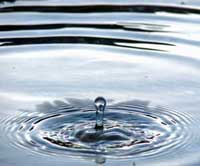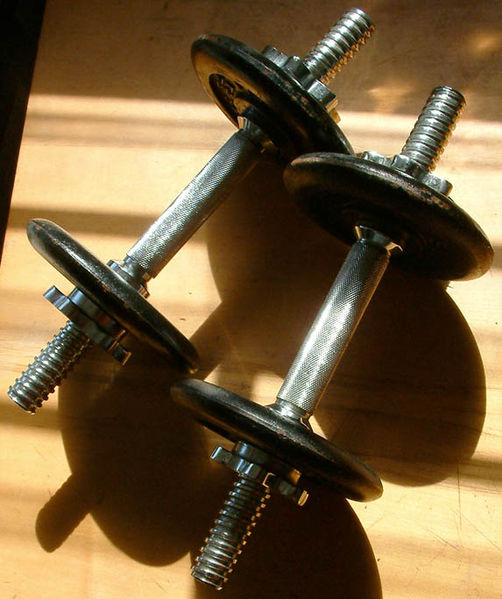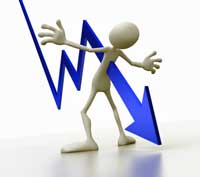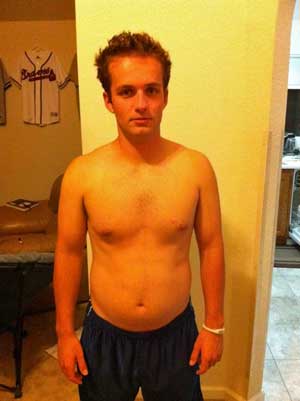

My Workouts
I’d started lifting weights at 15. Annually, I spent more than 1,500 hours working out, and by the age of 22, I had devoted over 10,000 hours of my life to the gym. By Malcolm Gladwell’s standards I was an expert at exercising. Most of my workouts were between two and three hours long.
Each time I walked on the gym floor I was entering a proverbial weight lifting marathon. I would grab two 80-pound dumbbells and do lunges from one end of the gym to the other—50 yards or so. Then, I would go to the leg press and fill it with as many 45-pound plates as it could hold and do as many reps as I could.
That was just the warm-up. No matter how you slice it, my workouts were primarily about pushing my limits. I wasn’t so concerned about being healthy or even looking good—although those were nice sidebars—my workouts were about pushing the envelope and getting better and better.
It was a healthy stroking of the ego, for sure, but it was more than that. Sure, I would lift heavier weight than most other people in the gym, but I was never one of those guys grunting in the corner of the gym to get people to look at me.
In fact, attention was the last thing I wanted. When I was weightlifting, I was in a zone I did not want to be broken from. Weightlifting for me was about being in a zone of muscle and power. I loved it.
The exception to my introversion in the gym was working with clients. I would typically take my clients through an hour high-intensity circuit workout. It took considerable energy just to demonstrate exercises and correct form, and for them it was a major workout, but for me it was small potatoes. (Little did I know what having little energy actually was.)
I remember sitting down for an initial consultation with a client. We had never met before and I was filling out a medical history form on her; I asked how many colds she had had in the past year, she responded with only one. I immediately thought, “She’s healthier than I am.” I had caught at least seven colds that year and had the flu and pink eye as well. Additionally, I had major insomnia that, at the time, I thought was genetic. Ironically, these are all typical signs of over-training and over-exercising.
It Happens
Then finally, the Sunday after Thanksgiving, I went for one of my marathon-like workouts and the walls started closing in. I was dizzy, with chills and intense heart palpitations. I thought I was dying, or at least having a stroke. It was a scary mess. I was eventually diagnosed with mononucleosis, and later, when I didn’t recover, ME/CFS.
A year or so after my acute infection I began to see Dr. Daniel Peterson. Now I was sitting as a passenger while my mother did the driving to Lake Tahoe. Dr. Peterson was the first doctor to take the time to hear my concerns. On the first visit he saw me for over an hour, a shock after my 10-minute visits to my general practitioner.
We both had high hopes for his treatment—antibiotics and immune modulation—but over the course of a year, my condition merely seemed to ebb and flow, without any sort of definite progress. Exhausted by the effort it took to seek treatment, now, three years after falling ill, I have taken a hiatus from doctors.
My case of ME/CFS seemed to come out of nowhere. Looking back, though, there were definitely signs of illness on the horizon. I don’t like to attribute any one thing to getting sick, but the combination of the college lifestyle—drinking games and kissing girls—along with over-training (and more synthetic supplements than I care to recall) probably spelled disaster to a weakened immune system. Of course I know many people in similar situations who are healthy. It’s simply unfair to blame the illness on anything I did, or could have done differently. Still, throughout my illness I have not been impervious to beating myself up.
Coping
Since my initial onset, there have been countless moments of depression and remorse for the life I currently live, sadness for the life that I left behind, and anger for the helplessness of having an illness no one seems to be able to understand, and most don’t know exists. Initially, I was shocked and frustrated with the thought that I might never be a fitness model, a competitive bodybuilder or even a personal trainer again. Not being able to squat twice my body weight, or flip that giant tracker tire in my backyard again seemed unimaginable. In the midst of overwhelming frustration I find myself using what little energy I have to let out my anger, or any other emotion I am dealing with at the time.
Getting Centered

Fully experiencing his upsets and then focusing on the opposite has been cathartic for Jamison time after time
However, after letting the tears flow and breaking a few inanimate objects, I always make it a point to get centered again. After all, it is only human to be angry, sad and/or depressed when faced with illness. Whenever I am coping with stress and various emotions, I try to just give in to the moment, but not to let the emotions consume me. In other words, I let myself experience what it feels like to be angry, sad, or depressed, but then immediately come back up for air— and experience how it feels to be the antithesis of those emotions.
This is a personal coping mechanism, which may not work for everyone, but I use it commonly. The process has been cathartic time after time. I may have had to buy my mom a new set of dishes from time to time, but in the end it’s worth it. Just as there is no feeling like having a good cry, or breaking a kitchen plate on the ground, there is no feeling quite the same as hope for the future.
Whether it is getting pumped to cook yourself an awesome dinner, or perhaps have a family member visit, looking to a brighter future has been an invaluable tool for me for staying optimistic with ME/CFS.
In this regard I’ve found that finding new dreams and aspirations are pivotal to healthy mental activity. In fact, I’ve found no aspiration is too small to have an influence on my happiness. Getting out of bed and stretching, or standing up while I do the dishes—even if only for a minute—is certainly better than nothing. On good days, I get by with a few squats or pushups. I aspire to do these exercises as much as my body will allow, and even if I can only do five reps, I will take it over none at all.
Finding Purpose Again
One day—if my body allows—I would love to reconvene with the old path I was on, but just because I can’t do that right now does not mean I don’t have a purpose. It is unfair to think that I don’t have a purpose, because purposes whether committed to or ignored are always present. Finding a purpose with my life has helped me to stay optimistic.
Whether it is to bring awareness to the illness, or somehow become a millionaire before I’m thirty (in my dreams), having a purpose has always been key for me. Old purposes have showed up in new ways and new purposes have manifested themselves during this big life change.
Not letting my limitations keep me down is one purpose I have. Staying centered and focused on what I can do – and celebrating that – instead of what I can’t do- is a clear purpose that takes work each and every day.
I firmly believe my purpose in life is also still fitness related. I can’t go out and train people anymore, but yoga and meditation, for instance, have really served me well while battling ME/CFS. That may sound a bit odd coming from a guy that used to only lift weights, but the truth is, with this illness you have to work with what your body allows.
My passion is exercise, and if I can’t deadlift 400 pounds, then I would much rather do yoga instead of sitting around wishing I could lift heavy weights again. Plus, I look at it all as an important part of fitness – and hopefully part of my rehabilitation process; you have to walk before you can run, or in my case, do yoga before strength training.
I now have the option to learn and advocate for an illness that I didn’t even know existed three years ago. ME/CFS may not be my passion, but it has certainly become my fight. While I still have hopes of training clients again I am a writer working from home now. I refuse to let my certification lapse, and have even trained a couple clients through video chat, which is, surprisingly, just as taxing as being there in-person. I have also been working on a non-fiction book based on my experience with exercise addiction and ME/CFS. I hope to have it finished sometime in the next year.
Moderation and Patience
This illness has taught me two vitally important things: moderation and patience. I now aim to work within my body’s limitations, instead of running it ragged, and I do my best to show patience with it whenever it does run out of energy and well-being.
Conclusion
Before my days of lying in the shower and sitting to do dishes, I was the sole survivor of a fatal car accident. There was only one other person involved in the crash, but walking away from it without a serious injury was a miracle to me. Sure, it was a traumatic experience, but it was still an experience, and that is exactly how I look at any bad things that happen in my life.
If you can find one—just one—good thing that came from an experience, than you are lucky to have had it. In the case of ME/CFS, or any other real illness/disease for that matter, it is an experience that not many other people will get to have. Just like I will never know what it is like to face the struggles of breast cancer, many people will go through life without ever feeling the symptoms of ME/CFS.
You may call that lucky, but—for their sake— but they will have their own fights and I hope they find wisdom in them. I’m looking for wisdom in mine.












Thank you for sharing your story. I know it will help others.
Hey Jamison,
I know this is years later but if you read this would be able to correspond through email? My story echos yours in ever way, although at a later age (36). I believe i also had symptoms far earlier and pushed through along with injuries i have sustained over the decades. If possible, pleaase repond and I can leave my email.
Thank you for telling your story.
Brandon
Hi Brandon,
I saw your comment was quite recent so maybe you’re still checking this page? I have a similar story, always been really active, lifting weights as well as cardio & walking everywhere. Got struck down with what I realised was CFS in early 2019, but in hindsight I think I’ve had it for years in a milder form but always put the symptoms down to other things, Training is my life. Would be good to chat to someone in a similar position, as my lifting friends don’t really understand what it is like. If you want to chat on email or other social media? (webbmaggot at yahoo. co. uk written like this incase emails get flagged for spam?)
Regards
James
I believe I have cfs too. I got extemely sick with a virus and I have never been the same since.
Hi, did he answer yet? I’m looking forward to hearing from you guys! I’ve been suffering from Post-Covid ME/CFS..
All the best!
Wow,Jamison, thank you so much for this moving testimony of your journey. You write beautifully. My heart goes out to you and, like us all with CFS, our lives took a real turn down a road we couldn’t have imagined. That said, you are right. Even getting out of bed, getting dressed, even if I only was back in bed an hour later, became a victory for me during my really terrible years with this. I am still very sick, after nearly 30 years (!) but I am grateful for all that my life holds. And it holds so much.
I am hopeful for some of the research that Cort has been reporting on. We will see a day when this mystery is finally unravelled.
Jamison- thank you for this inspiring piece. I’m in that low place now of the ebb and flow of this disease. This is also helpful to me in that I can share it with my adult sons who still do not understand what happened to their mom. Keep writing and getting the word out.
I jumped at Jamison’s story when he offered to write the blog because I think it’s so powerful for people to hear that even this kind of paragon of fitness can get taken down by ME/CFS. If this could happen to Jamison it could happen to anybody.
Jamison,
I’m walking in the same shoes as you are, unfortunately. I totally understand your anger and frustration. As a gym rat of over 20 years, I became a personal trainer and worked at a national fitness chain for two years before fibromyalgia & chronic fatigue took my life away. It’s been almost two years already, and I found myself crying in my rheumatologist’s office last week about how much I miss my job. I loved the gym and I loved being a trainer. I’m now very deconditioned and gained 25 pounds. Your story brought tears to my eyes.
I still hold out hope that one day I can go back to training. Like yourself, I have kept my certification current. In spite of the huge emotional and physical struggle, I refuse to let this thing that has taken over my body win.
One day we will be back to training again. Maybe not the intensity we once could, but in some capacity. We can’t let this thing beat us!
Sharon
Hang in there Sharon! As a former big exerciser I’m rooting for you (and me and Jamison). You never know what the future might bring.
Jamison,
Thanks for sharing your story. Like you, much of my sense of well being, vitality, and joy were embedded in fitness and athleticism. It is helpful to hear of someone persevering and finding hope in the face of a similar loss.
Jamison, you are still hot 😀
Thank you for sharing your story, little by little you will go back to great fitness, from the outside it sounds like you were kind of overexerting yourself before, you will be able to push the envelope in a lot of other directions now, please never lose hope.
Tina- That is really kind of you to say, all of it, thank you!
Sharon, Andrea, and Jeanie, thank you so much for your comments. I’m glad each of you has been able to relate, it is always nice to hear from others.
Thanks so much for your bravery in sharing this story Jamison.
Clearly this experience has made you a stronger, wiser person, and I look forward to seeing your accomplishments because of, and not in spite of, the disease.
Wow. This is a great story to illustrate to non-me/cfs people that even with a desire to exercise and an iron will behind it, our bodies will simply not let us follow through.
Cort, Thank you for the encouragement. Jamison, thank you for telling my story through your eyes. It helps so much to know I’m not alone with this struggle.
Jamison, thank you so much for sharing your story. I’m so glad you wrote it, as I sometimes question whether I’ve brought ME/CFS on myself by not taking care of myself physically – no exercise, overweight for many years, not eating the right foods. When I’m thinking logically, I know this isn’t true, but then those other days….well, you know. My son has stopped contact with me partially based on his belief that I’ve made myself ill by not being a raw vegan and exercising – I wish I could send him your article. But whether it would make a difference for him or not is really unimportant, I guess, since it made a difference for me. Thank you again, Jamison. And keep up your wonderful attitude – it certainly helps the rest of us!
Correction to the above: “I wish I could send him your article. But whether it would make a difference for him or not is really unimportant,” It should say: ‘is not really
**important**’ Sorry for any confusion… (can we blame on my brain fog?) 🙂
Thank you so much for sharing your story. Your generosity helps build a sense of community for others with CFS/ME and lets others know that our experiences are real and not a made up syndrome. Thanks again. I wish you health and contentment.
overexercising when I thought I’d found the solution to my problems (gluten free diet) almost caused me to become bedbound. I miss the exercise. so sympathise. Excess cortisol, released during exercise, can cause fatty liver disease. Your supplements may also have caused liver problems. If you can get a Fibroscan I’d recommend it, blood tests aren’t that useful.
Since I began taking NAC and ATP I’m able to exercise a little, although any headaches have me stopping immediately. I’d also suggest get vitamin D3 checked, surprisingly there are reports of athletes having low levels.
Thank you so much, Jamison, for sharing your story with us. Even if we’re not the athletic types, most of us can relate, I think. I’ve always loved to hike – nothing difficult, just peaceful hikes in the country or on easy park trails, and when that’s gone, along with all other vestiges of our past lives, its tough. I’ve always thought it must be harder for people like you, whose lives were centered around sports or exercise. Can’t say I’ve broken any plates, although I’ve wanted to – ha! – and a whole set, even better! 😉 Screaming or crying helps from time to time though, I agree. People who say they NEVER have a negative attitude really irritate me, actually. Its only human to vent your frustration now and then and then get on with finding new ways of making your life meaningful, and that’s what you’re doing. Bravo!! I look forward to reading your book.
Thanks Nan! I like to think we are all athletes in our own way, or at least have the right to be if we wish. Of course, with ME/CFS that philosophy goes right out the window, but it has taught me how to appreciate even the littlest bits of exertion and that really is invaluable. Thank you so much for your kind words, everyone has left such kind and sweet comments, it means so much, it really does!
I’m glad it helps, Jamison! Best of luck!
“it has taught me how to appreciate even the littlest bits of exertion and that really is invaluable.”
I really like this perspective. Appreciating even small amounts of exertion is very helpful to me.
ME/CFS 32 years. Lost my career, many friends, my home, etc. You have learned a lot in 3 years. Keep positive; concentrate on what you have and not on what you’ve lost; find wonderful things you are able to handle. I am still doing artwork at the times I am able, have some new friends and a new home. Life doesn’t begin the day you recover. It’s going on now so we can make every day a good day. Love to you.
Jamison, have you been tested for other Viruses as well?
Thank you for your honesty in sharing your feelings of somehow being at fault, beating yourself up for it, etc. I, too, have found that to just be with those feelings is very cathartic…I’ve found this type of process to be rather amazing and, yes, it does seem to run in cycles. So helpful to read about your experiences with this.
Very inspirational and uplifting. Great writing Jamison. Telling it like it is, but with a joyous heart.
If there’s one thing I got out of most of my adult life of chronic pain, it’s patience.
I don’t have goals in my current life (except to take the perfect National Geographic standard photo) – I live in the moment, with what I have, and ensure I make the most of every good day (of which there are many, now I’m not working).
Fill your life with negative emotions – anger, jealousy…..whatever……and you’ll never find Peace of Mind or Happiness.
Hey Jamison, did you also suffer from hyperventilation and panic attacks? My first symptoms also includes tachycardy and dizziness after exertion.
I don’t know about Jamison but I had lightheadedness and panic attacks with exercise when I first started coming down with ME/CFS 17 years ago. I was in good shape as well, weights, hiking, biking several times a week for years and was only 25 years old. Then mild symptoms occurred from time to time and eventually there was a point where every workout made me have symptoms immediately and even worse problems a day or two later. Unfortunately I kept pushing for another year or two due to a ignorant doctor combined with my own stubbornness (a really bad combination!).
Jamison…
I know this too well… At 39 years of age…. I won a fitness age of 18 with 11.4% body fat… then I got ME/CFS…
Francesca
Jamison, You wrote a very moving insight to your ME/CFS and FM. I found out that I was sick in 2009. I am an Architect with my own business and somehow worked 2009 to dec. 2010 with ME/CFS and FM. It was very hard to carry on and had to close my business jan. 2011.
I was very fortunate to become a patient with Dr Kimas and Dr Rey here in Miami. My condition got so bad that I was in constant pain, living on pain meds, never remembering anything regarding my short term memory and having several anxiety and panic attacks every day. I have a partner that has been very supportive both emotionally and financially.
During those years, until recently, I turned to alcohol and smoking to help put me in a dull mood to help with the pain even knowing it would make me feel worse at night-but trying to get through the day. I would even start my day with vodka in my coffee.
I have been on meds for my nerves and depression, which help to a degree. I was placed on an aggressive treatment of vitamins in 2011 and must say after a year being on them they have been helping.I still have not worked and remain home, sometimes not leaving the house for days as I would panic just driving short distances, but am getting better.
If you are interested as to what I take regarding pharmacy and vitamins, please let me know, as I would be more than happy to share this with you. I don’t have much contact with anyone that has this terrible affliction.
Thank you for sharing your story. August augcook@bellsouth.net
Be well
What a beautifully written story’. I am also battling ME/ CFS along with fibromyalgia . I had to retire from a 22 year career of teaching in 2011.just like you, I miss the classroom so badly. I let my teaching certificate expire , so that is keeping me busy for now. I have given up hope as far as the medical community is concerned and planning a holistic approach beginning with acupuncture, yoga and swimming . These things take everything out of me but will help in the long run. Good luck to you all everyone suffering from such a misunderstood illness. I am beginning my blog today and hope to be able to inspire people like you are doing with your story.
Holly
That was great, Jamison!
Wishing you a big step towards better energy and health. I found slow and easy steps take me further than furious sprints to grab my opportunities. My body signals are my best friends and indicate time to shift. Good Luck!
Jamison, you write very well. Your shared experiences are valuable for those of us who are ill and those of us who are not yet ill and even some of us who may have the good fortune to drop dead without ever getting ill. I consider your insight about your emotions to be essential.
When I was young I set a goal that emotions would flow through my body like water. Getting stuck is too painful.
Yeah, I am a lot older now (62). I have found that acceptance is necessary to get on with your life since cures are not currently available. Meditation practice is a very good approach to reaching acceptance and clarity. I use yoga to stay loose and reduce muscle pain. There is life and contentment with ME even for us recovering endorphin junkies – I sold my weights and quit the gym although it occasionally crosses my mind as I am wheeling about the house in my power chair that I might plug in my treadmill and take a little walk … well maybe not today.
You are amazing. I always find it encouraging when I read a story by someone who is getting on with their life and and finding there is a lot below the surface.
Thank you.
I was very moved by your story Jamison, thank you for sharing it with us.
It was beautifully written and so honest and really showed the emotional angle of learning to live with a chronic illness.
I was also pleased to read that you have, somehow, found some positives from your experience. I had to laugh too when you mentioned that you felt the illness had taught you two important things – moderation and patience. I too have had to learn those lessons, and I was a stubborn pupil who did not take very kindly to them, but I have had to accept that they are part of my coping mechanism. Sometimes acceptance is easier than a battle!
I hope that you continue to keep your spirits up (apart from the occasional plate smashing episode – I might well borrow that idea!), and that you manage to realise your dreams, in whichever form they may take.
Wishing you every success.
Tisha
Great attitude Jamison. I’ve always thought fitness freaks make excellent patients; we listen to our bodies, have a good understanding of adaptation, and are able to employ extraordinary discipline in order to achieve our goals. I too was working as a personal trainer when PEM hit in 2006 and I had to leave the gym and that active life.
Nowadays life is not so bad. I’m grateful for what I still have, and I’ve learned so much about my condition that I’m really quite optimistic. You picked the right time to fall sick with this disease. Things are going to get better.
Looking forward to a brilliant future is something I stick to as well and I don’t see anything wrong with it. Viktor Frankl wrote about this in his book “Man’s Search for Meaning”. He claimed it was one of the most valuable tools concentration camp victims could put to use. Those were the ones with the greatest chance of making it.
Thanks for the share.
Yeah, overtraining was the culprit in my case too. I used to get knocked out 6 weeks at a time with overtraining syndrome before finally keeling over, and it’s now been 6 years. I only wish I knew better to back off back then.
One thing I learned over the years is that activities with CFS is like athletic training for competition. We are at the very edge of our limits even when we do little things like ADL, and ensuing PEM looks pretty much like an overtraining syndrome within CFS. I also learned that the amount I can do varies exponentially with the intensity, just like in athletic training. For example, I only can walk 500m at 102 steps/min without getting sick. But I can do 1000m at 98 steps/min, and 2000m at 94 steps/min. This is very similar to Olympic skaters who do 5000m at 29-30 sec/lap, but require30-32 sec/lap to do 10,000m. (~5% drop in intensity results in twice the distance).
Taking queue from this insight, my “training” these days look pretty much like yours: stay well within my limit and do things in short bursts like what athletes do in high intensity interval training. (Running errands on public transit seems particularly good, probably because it consists of walking a few hundred meters at a time and then sitting in a subway or bus and then repeating.)
Anyway, I wish you luck with your recovery and looks like you are on the right track!
Interesting TK. I found that I was able to build up my stamina when I was bicycling quite a bit but I paid for it in fatigue and pain. It was weird to watch my muscles get bigger and stronger while I went on longer and longer bike rides (and got wiped out more and more afterwards.)
I think shorts bursts is the way to go.
Yeah, I think doing it in short bursts is definitely in order if you are doing a high intensity activities like biking or weight lifting. I used crap out the next day when I was doing 6 reps of 10 lbs weights. Reducing it to 4 reps of 12.5 lbs worked like a magic. Not sure if it is applicable to lower intensity ones like walking, but I’m planning to incorpratee faster 100m walk x 4 into my 2k walk when I resume it in the Spring. (I believe that’s what Dean Anderson did when he started to jog). I’ll report back in the fall 🙂
Thank you for writing this Jamison,
I think it will help many of us dealing with the guilt that we sometimes feel with this illness. Being told by doctor’s that are symptoms are not real and we “just need to get out and exercise more” is obviously not helpful and is proven wrong by your story. Who is more motivated than a guy like you?
My symptoms have improved over time and I went form not being able to walk down the street without heart palpitations to being able to run a mile and work out for an hour or so at the gym (although I did have to sleep for the rest of the day) and I have been able to return to work although the brain fog makes things difficult. Although my expectations in life are significantly lowered, I still appreciate the fact that things have gotten better for me.
I hope they do for you as well.
Hi Jamison
My name is Lauren. I just finished reading your post. I also have CFS. I can really relate to your situation. Before I came ill, I was a competitive figure skater and trained for at least 5 hours a day. I understand how hard it is to let something go that you have a passion for.
As you can see I have attached the link to my Facebook page. If you’re not married or don’t have a girlfriend I would like to get to know you better. You sound like an amazing guy and you are very handsome 🙂
-Lauren
Jamison, I’m lying here just read your story almost in tears. I can relate to your story 100%. Loosing your health when you are so active is like loosing your masculinity, your whole purpose of being a male. You do have to totally change your philosophy on life to survive and to recover. Before my crash I was a competitive rower and cyclist along with drinker and socialite. I’m now seven years down the road and have found the replacements in life that you spoke about. I now teach people how to row and cox races. Sometimes I can get out in my small skiff with my dog and have a row myself, always keeping my heart rate to below 130bpm. I love the peace and quite I find once I’m out at sea.The smaller things in life get me going now, not the male ego stuff that once worked. I hope you recover to a level of activity that you can find contentment in. The book venture sounds interesting, can’t wait to read it. Take care.
Jamison,
Thanks for sharing your story, if you will. It’s “nice” to hear from other people who are passionate about sports diagnosed with ME/CFS. I can so relate to your words. My motto is: “Do One Thing!” Sometimes you just have to do one thing, even if that is just somehow getting out of the bed. I hope we hear more from you in the future….
I also have CFS/ME for 3 years now. It began after my daughter was born and I had no sleep, working, no rest periods all day,etc. Two years prior to this, I had two episodes of A-Fib and was feeling the severe fatigue in my legs. I was 35 y.o.. After A-fib and fear of stroke, I slowly began to work out again but suffered sometimes with mild to moderate fatigue.
As my cardiovascular endurance improved, I went for a long bike ride and suffered for 2-3 weeks at least. Then, my daughter was born and my CFS was back. I saw back because when I was 16 y.o. I was diagnosed with Epstein Barr Virus. This was the changing point in my life. I was confined to my bed for 2 months, didn’t listen and got more sick, then went to school and came home to lay in bed all day and weekends. I did this for 10 months then began to hangout with my friends for a few hours. I was very active playing handball all day and riding my bike prior to EPV.
It took 2-3 years before I could play a game of handball or workout but I would have severe pain and fatigue for a week. Over the years, I was able to do everything workout, go out and party drinking alcohol until 6 am and live my life like a normal guy in his early 20s. I was also an adrenaline junky and didn’t everything to the max.
My nutrition was terrible with a lot of fast food and cakes. No veggies. Although every few months I will get a slight relapse of CFS but recovering in weeks. Now at 40 y.o, I suffer daily from mild to severe symptoms. Have 2 toddlers and I have a physical business. I see patients with severe disabilities in their homes so I am on the run all day.
Every year, it gets a little better but it’s been three years now and still get severe symptoms when I try to begin resistance training with weights. I don’t push to rep out to fatigue and don’t work out my legs because that will 100% make symptoms worse. I try to keep my heart rate below 115-120 with all activities and try not life heavy except for my patients. It’s a struggle every day and everyone has their opinion on how to improve my health.
I hate explaining to everyone that it’s not in my head. I am positive but if they ask how I feel or I say I can’t do something because risk of exacerbating symptoms then I’m negative to them. My wife also doesn’t understand like everyone else who doesn’t have this disease including doctors.
I do believe I can get back into good health but it may take a few more years. I know I will always have this and there is no cure but new research has show markers in the blood. I wanted to bring up Epstein Barr Virus disrupted my immune system causing a dysfunction to the way we respond to physical stress more than emotional.
I have treated my symptoms naturally with small amounts of sea salt in my water when I wake up to prevent the orthostatic intolerance and reduce the brain fog.
Anyway, my email is joed92400@aol.com for anyone who is experiencing this and would like to contact me for help with this debilitating condition. I am alone and don’t speak to anyone else with CFS but I am very educated due to years of research, experimenting with supplements and conserving energy. I am not saying I can cure this but hopefully I can help make your quality of life better
Thank you so much for sharing your story. I have been suffering with ME/CFS. It is an uphill battle that has been so tough. The worst for me is the fact that others don’t always understand or even believe… Best wishes to you.
Have any of you been tested for small fiber neuropathy? My symptoms onset with this, which was induced by vitamin B6 toxicity.
Jamison, thank you for your article, and I wish you well. It’s true that every one of us does have SOMEthing to be grateful for. Those are the things I try to focus on now. But yes, I also get times when negative thoughts come, and I might cry before I sleep, etc. I let it happen, let the tears come, then get up in the morning and soldier on.
I think I got overtraining syndrome. Not from working in the gym but I was walking too many miles every day, lifting and carrying, working on firewood. Couldn’t rest, pushing my small frame 110lb body. If a thing wasn’t impossible, it got done.
No one to give me any help with work, so I had to do it all myself.
But in between what was necessary, I did what wasn’t necessary also -such as going for regular 10 mile walks on difficult terrain, thinking nothing of it, thinking it would just give me a hearty appetite.
Pushing myself all the time, thinking it would make me strong, thinking “weight bearing exercise is good for my bones” (post menopausal)
I lived my life outside hauling stuff about, pounding up hills, carrying two 50lb logs on my shoulders from woodland, through fields to car….ten times in one afternoon. Just to get wood for the winter. In the freezing cold, in heatwaves. Year after year.
Actually I was fairly happy being outside working like that but it happened for many, many years, and I didn’t slow down when I felt my body asking for rest, and I was getting older.
Didn’t slow down when I’d wake up exhausted, or not want to wake up at all, just pushed even more, thinking hard work will make me snap out of it and feel better.
It’s sad because I wouldn’t have treated anyone else like that. And I wouldn’t have treated a dog like that -so why myself??
I only ever caught one cold about every three years!
The “thing” that led to what is behaving like ME/CFS but has never been formally diagnosed (though suggested by 2 doctors two years ago) -happened out of the blue. I even remember the date and time.
It was like being hit by a creepy kind of truck. A sudden bunch of symptoms, and a terrible exhaustion that has not let up yet for two and a half years, with PEM and return of initial symptoms after any exertion past my new limits.. The illness itself was speculated by a neurologist to be an atypical form of “migraine” -not EBV or any virus.
So yes, I’ve learned my lesson. But what a price to pay.
My lesson is “You simply can’t treat a body that way.”
Have you ever read the book the rain barrel effect by stephen cabral? Highly recommend it. It goes over how toxicities and nutrient deficiencies cause your rain barrel to overflow and you become diseased. You can truly heal from this but def need to see a true functional medicine practitioner that does in depth lab testing to really see what is going on at a root level
Hi sorry to hear your struggles and great attitude. I would suggest: breathing/mindfulness exercises using HeartMath 10-30 min or 300 points a day and seeing Dr. Hector Bonilla at Stanford. You might also get checked for POTS which often accompanies CFS. I had CFS in 2003 and recovered though to a lower capability than before. Best wishes.
Same History. Overtraining and then Me/cfs. I was a Boxer. Still sick 🙁
Isn’t that something! Hang in there, Jordan!
Thank you, I found this article very helpful. I am struggling to come to terms with having to radically change my life and leave a job I love. and become dependent on my husband instead of being the main bread winner. It is scary not knowing what the future will be and my fatigue symptoms some times make me feel like I am totally trapped.
Good luck at Eithne at getting through all this. Somehow we manage to – you are not alone.